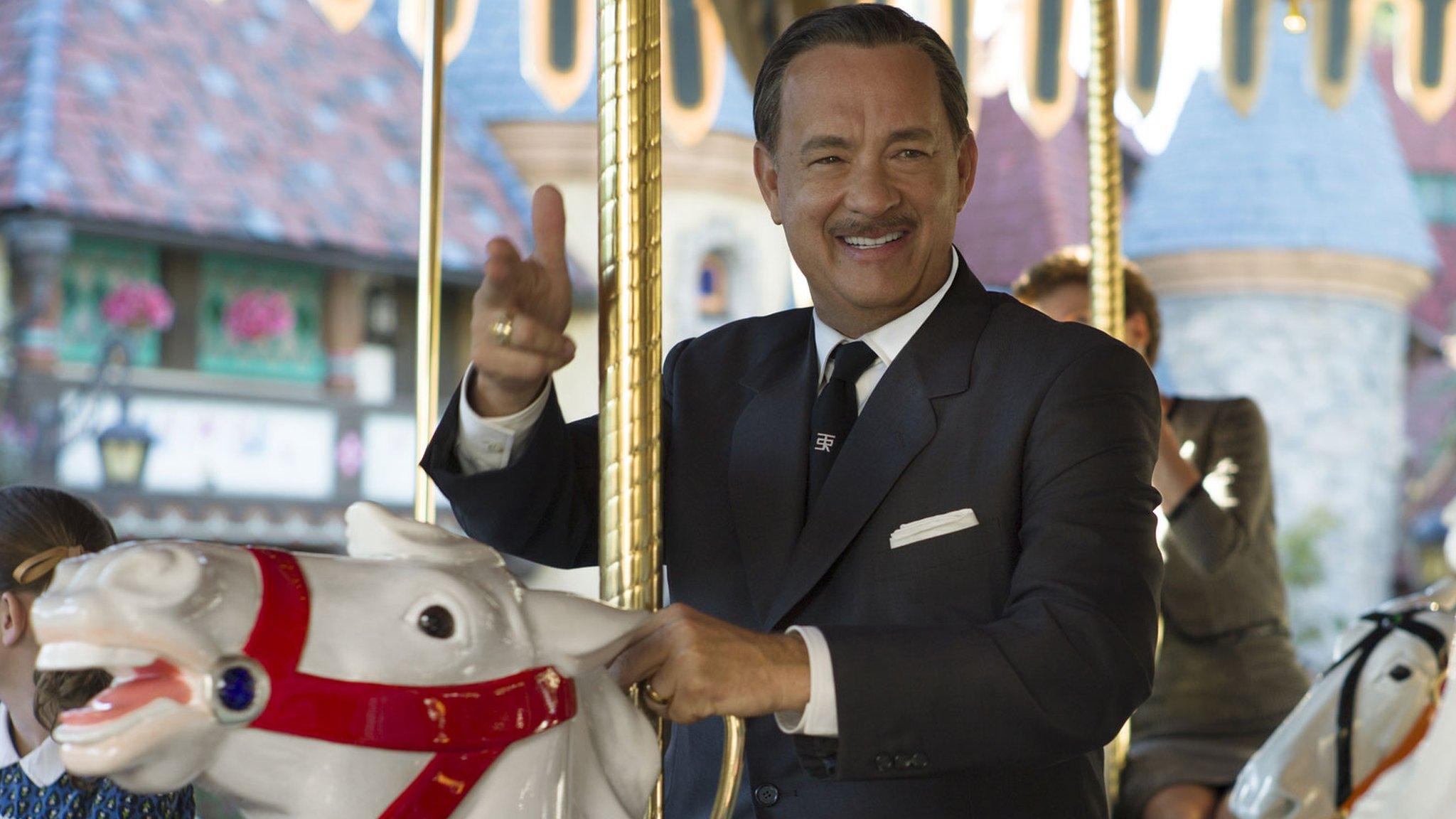Mary Poppins songwriter 'thrilled' at Proms singalong
- Published
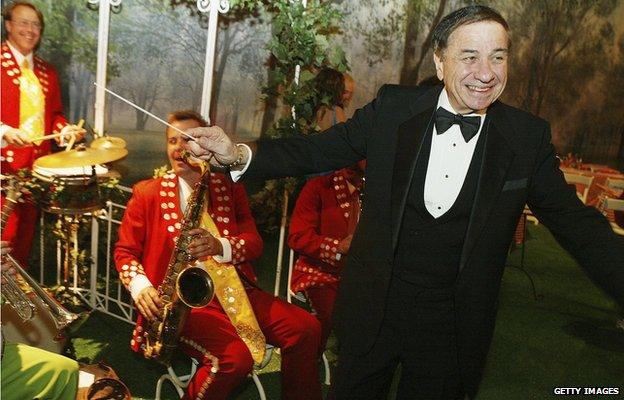
Richard Sherman conducted the band playing music from the film at Disney's Mary Poppins 40th anniversary party in 2004
Alongside regular fixtures such as Land of Hope and Glory, this weekend's Last Night of the BBC Proms will feature a first - a massed audience singalong to the classic Disney score for Mary Poppins.
Songwriter Richard Sherman says he's delighted at the accolade - but that without Flanagan and Allen and Noel Coward none of it might have happened.
It falls to Ruthie Henshall this weekend to lead the Albert Hall audience in the Mary Poppins singalong at the Last Night of the Proms.
She'll be encouraging the audience of 5,500 to belt out the famous songs.
From BBC Proms in the Park events in Glasgow, Belfast, Swansea and Hyde Park, London thousands more will be singing an arrangement of five songs made by Anne Dudley.
It will culminate in the tongue-twisting Supercalifragilisticexpialidocious.
Origins of the songs
First heard in 1964, numbers such as A Spoonful of Sugar and Feed the Birds are known to children, their parents and grandparents.
And if the film score has any rival in the affections of the public it would almost certainly be by the same two songwriter brothers: Robert B. and Richard M. Sherman.
From 1960 the Shermans were Disney in-house writers, often known simply as The Boys. As well as Poppins they wrote the scores for The Jungle Book, The Aristocats, Winnie the Pooh, Bedknobs and Broomsticks. Away from Disney, they wrote the songs for Chitty Chitty Bang Bang.
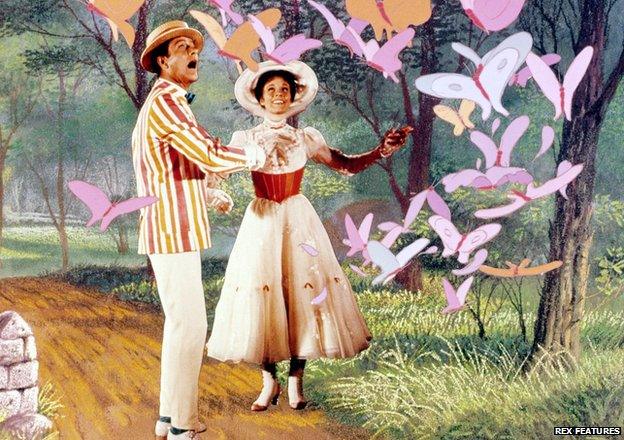
Sherman said the songs he and his brother wrote for Mary Poppins were inspired by Edwardian British music hall music
Robert Sherman died two years ago aged 86. But his younger brother Richard is alive and well and living in Beverly Hills with his wife Elizabeth.
He was thrilled when he heard the BBC wanted to use the Poppins songs at the Last Night of the Proms.
"You know Bob and I were massive anglophiles - eventually my brother went to live in London. There was something about those old British music hall songs we enjoyed, although they were before our time.
"Take a song like Boiled Beef and Carrots by Harry Champion. There's an honesty and a vigour to it you can't beat. Those songs really influenced what Bob and I wrote for Mary Poppins.
"Early on the decision was made to set the film in 1910 - earlier than the original stories PL Travers wrote. So we needed that Edwardian music hall feel.
"But I love British songs from the next generation too. Noel Coward wrote fantastic songs and performers like Flanagan and Allen had material which is so evocative even now.
"It's a tradition Bob and I drew on for Mary Poppins. So to be part of the Proms in London feels very right."
Working with Walt Disney
Richard says Walt Disney, who died in 1966, was a keen judge of a song's merits.
"He liked us because he knew we were story men: the numbers couldn't just be pop songs. So Bob and I would perform a new song or a whole sequence for him, with me at the piano.
"He didn't give huge compliments: the most you would get might be 'that'll work'. But it was enough.
"He understood song the way he understood the visuals. If he didn't like a number he could take it apart and explain why it didn't fit the moment. So to deal with someone with that kind of brain was special."
Richard admired everything about the film from the casting to production design.
"Julie Andrews was already known from My Fair Lady on Broadway. But she was genuinely perfect for the main role - a little stern but warm underneath.
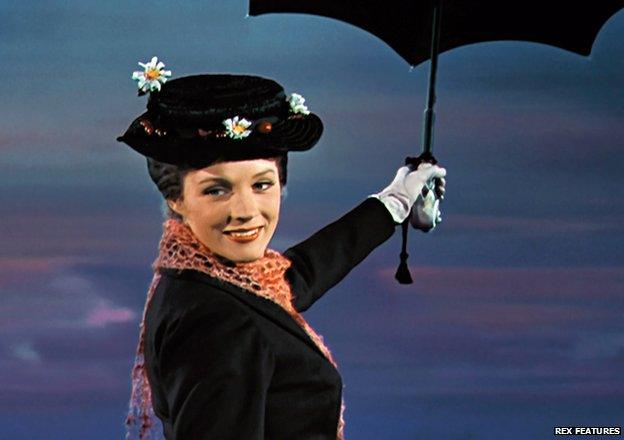
Sherman praised Julie Andrews as "perfect for the main role - a little stern but warm underneath"
"David Tomlinson could not have been bettered for Mr Banks. And the whole world fell in love with Dick Van Dyke as Bert."
Richard pauses before tackling the one aspect of the film frequently criticised since.
"Sure the Brits didn't really take to Dick's Cockney accent. But he had such a humour and a zest on screen - look at him in a big number like Step in Time, he's magnificent."
Finding the right ending
Richard Sherman recalls the way that song came about.
"It's not the best known piece in the score but it really works. We needed a dance number on the rooftops of London with the chimney-sweeps and Walt asked Peter Ellenshaw, who was British and our matte artist, if he knew songs which might have the right feel. It was Peter who mentioned Knees Up Mother Brown.
"So one day Bob and I walked into a room and there were Walt and Peter Ellenshaw, plus Don DaGradi and Bill Walsh who were writing the screenplay, all kicking up their legs like madmen and singing Mother Brown. Walt said Boys, write me something like this. So we did."
The way the Sherman Brothers wrote was shown in last year's Saving Mr Banks, about the origins of the Mary Poppins film.
"People always ask if writing with your brother for half a century was a problem. I would say it was an accomplishment. We learnt to leave personal feelings at the door and we worked very hard at the projects.

Dick Van Dyke caught up with Richard Sherman at the 50th anniversary commemoration screening of Mary Poppins at Chinese Theatre in Hollywood in November 2013
"I sat at the piano and Bob sat at his desk. Then we'd throw ideas back and forth. If Bob heard something he liked he might say, 'why don't you try it like this…'
"But we were both word men and Bob had a big influence on the music too. So it's not that I was the composer and he was the lyricist."
Richard recalls that finding the right end for the film took a lot of work.
"You have to remember that in the original books Pamela Travers wrote what are really short stories or episodes. There was no through line to the story.
"But when we were boys Bob and I loved to go kite-flying with our father: it was a wonderful thing to do. So we discussed with Walt whether there was something there we could use to give the movie its end. It gives an emotional close to the film which Bob and I were proud of."
The Mary Poppins medley at the Albert Hall will be happening early afternoon in California.
"If we can't find it live on TV or online we'll catch it in recorded form. So I hope I and my wife Elizabeth will be singing along in Los Angeles. And maybe our children and grandchildren too."
- Published24 April 2014
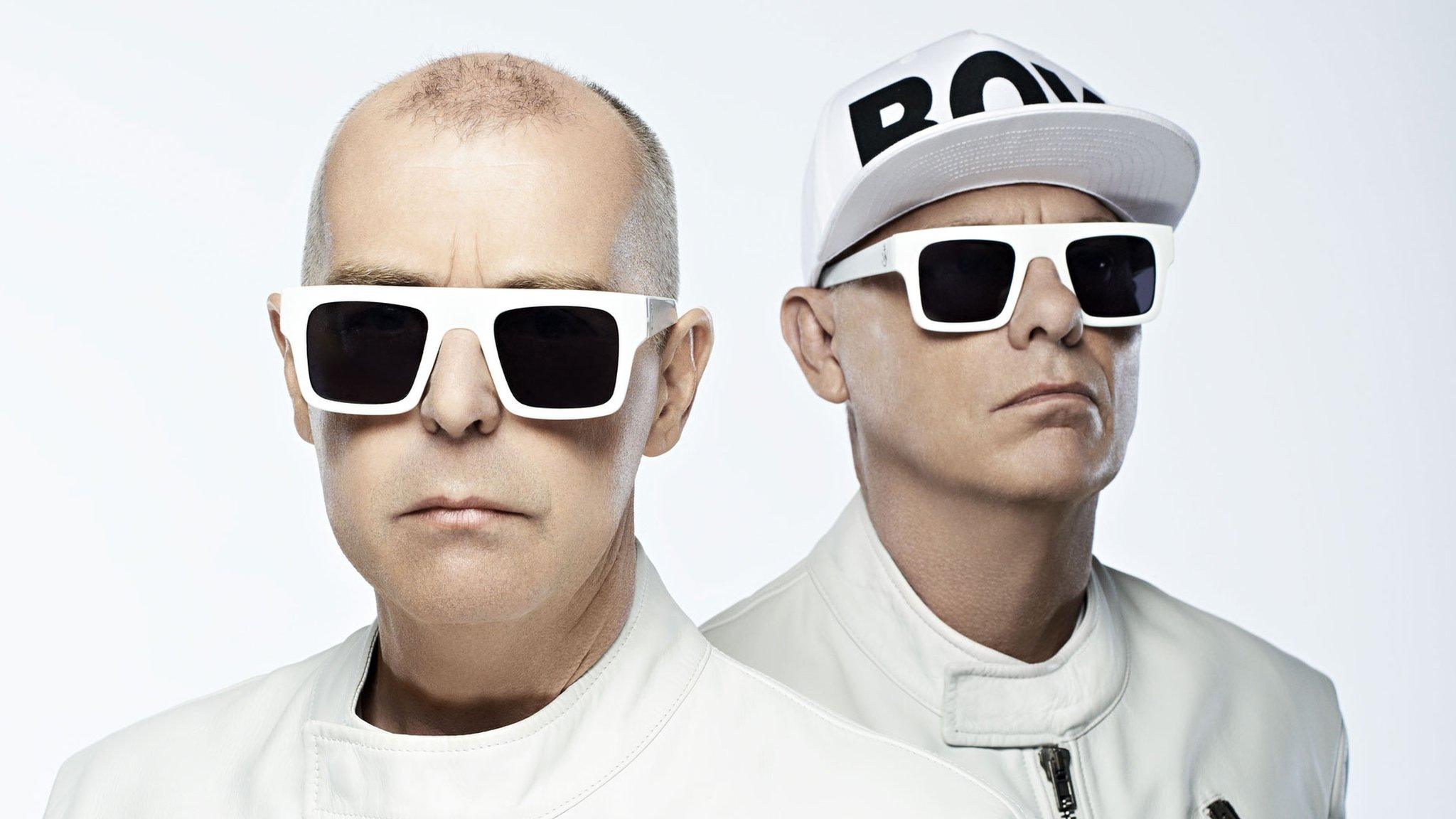
- Published24 March 2014
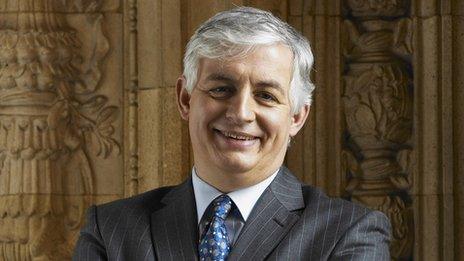
- Published20 October 2013
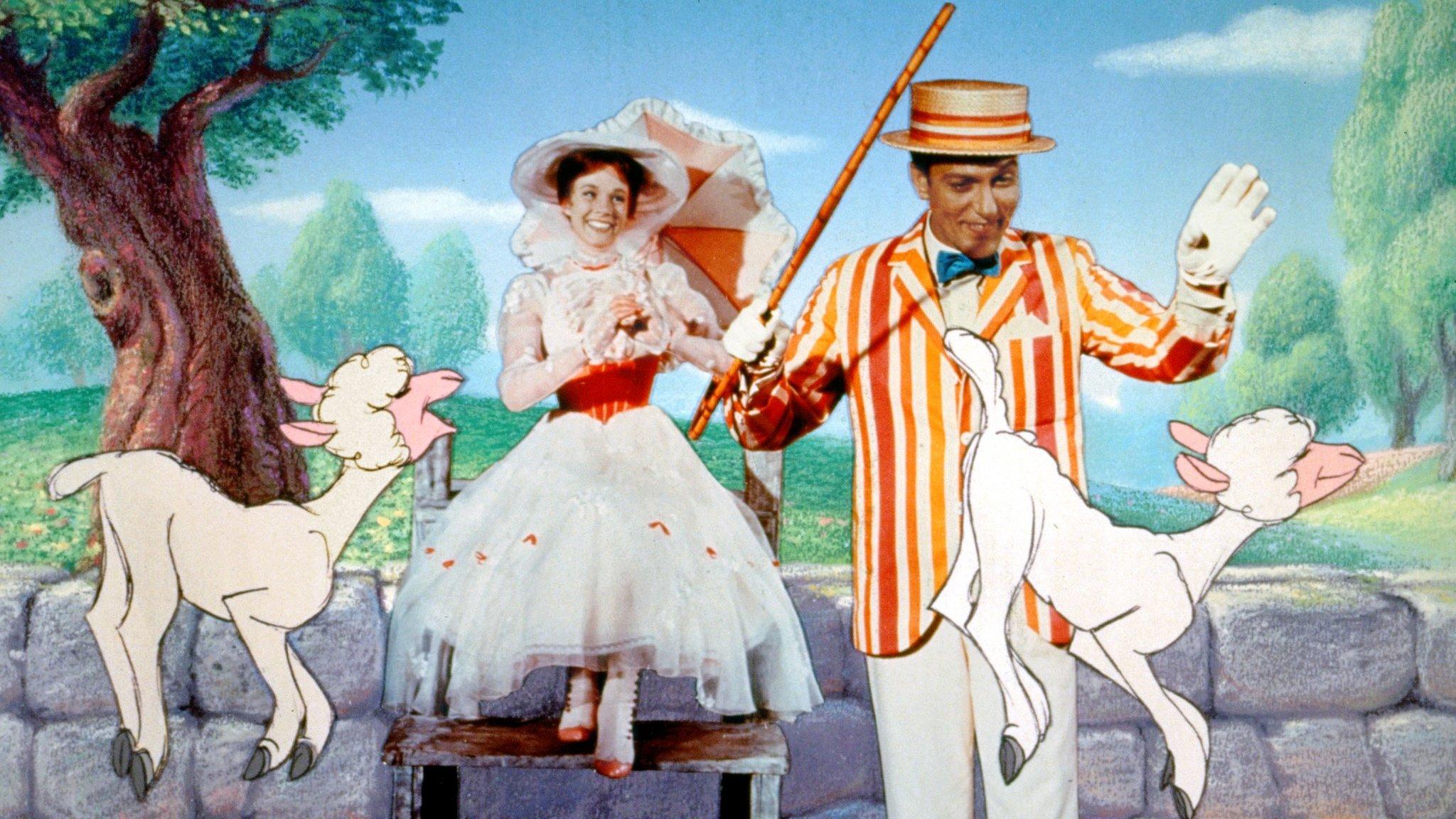
- Published28 November 2013
